by Alice Wilson
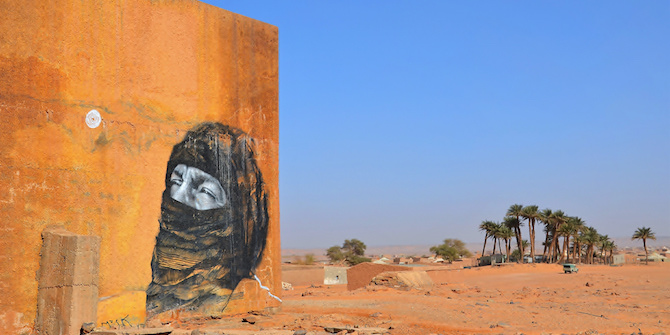
Histories of state formation in the Middle East and North Africa recount how tribes have made states, states have made tribes, and actors claiming to represent each have imagined the other as a threat or opportunity for consolidating power bases. But familiar questions about tribes and states as potential allies or rivals overlook newer questions which in times of political violence and economic instability are all the more significant: can the role of tribes go beyond simply weakening or consolidating existing forms of state power, and instead involve the transformation of state power? Might tribal relations offer possibilities for changing the terms of participation in and access to state power? In-depth studies of different attempts to transform state power in the Middle East and North Africa, both revolutionary and non-revolutionary, state-led and tribe-led, suggest that tribes can offer networks and resources for transforming state power.
The most famous and, in aspiration, most radical projects for transforming state power in the region are revolutions. Whether revolutions have emerged in the heyday of anti-colonial nationalism or to challenge neoliberal authoritarianism, leaders and grassroots participants in revolutions frequently assume that success in seizing and transforming state power entails making national or class-based connections that supersede and even replace those of tribes. Revolutionaries typically mobilise around collective identities, goals and narratives such as justice, freedom and dignity which are decoupled, at least in international media discourses, from local contexts such as tribes.
But revolutions are more than grand narratives; they are made up of everyday lives. Close examination of those living through revolution shows how tribes can offer networks facilitating revolutionary participation, as well as resources for building revolutionary state power. For instance, in rural Iran in 1979, when the political repression of the Shah’s government had incensed villagers, what motivated and facilitated individuals to join the revolution was their tribal political culture of taifeh. Similar to other tribal forms across the region, a taifeh is a dynamic political coalition of persons with shared interests which brings together but also surpasses kinship groups. This local tribal political culture facilitated both male and female villagers to join revolutionary protests and transform state power by bringing down a regime. But revolutionary activism here also transformed perceptions of tribal political relations. Villagers recognised explicitly women’s contributions to developing political networks in the revolution, where they had not recognised this in village politics.
Even when revolutionaries ostensibly reject tribes, tribal relations can still constitute a resource for building a transformed, revolutionary state power. National liberation movements in the Middle East and North Africa have officially promoted national identity over tribal identity, seeing the latter as a threat to nationalism and socialist-inspired visions of an egalitarian society. The now 40-year-old liberation movement of Western Sahara, Polisario Front, seemingly fits this pattern. Although both internal and external critics of the movement speculate about the extent to which unofficially tribal affiliations may persist and influence access to positions of power, Polisario’s dominant vision of state-building has rested on a rejection of tribes.
Yet in both official and unofficial ways, in this ostensibly anti-tribalist revolutionary government, officers as well as lay refugees use tribal relations as significant resources for building revolutionary state power. Many in the refugee camps see the grassroots participatory meetings which precede elections and the Polisario General Congress as a reworking of the tribal council (jama‘a). Furthermore, in ways not recognised by the front’s official discourses, tribal relations have helped build the revolutionary state.
In the 1970s and 1980s, refugees resolved disputes through a Justice Committee composed of women, thus adapting and radically transforming former practices of (male-dominated) tribal reconciliation (sulh). Additionally, one of Polisario’s longest lasting mechanisms for conscripting refugees’ unpaid labour is a reconfiguration of work parties (twiza) which historically recruited participants predominantly through tribal networks. The reworked revolutionary “campaign” (hamla) is similar in its light-hearted social atmosphere and sex-segregated form, but differs in recruiting people through links of co-membership in the liberation movement. Here, the project to transform state power and create a revolutionary state with opportunities for greater participation and redistribution of resources (and responsibilities) relied on a recycling, and not simply a rejection, of tribal relations.
It is not only in exceptional contexts such as revolutions that tribes offer networks and resources for transforming state power, however. Nor is such a possibility dependent upon the initiatives of state officials. In Oman’s southern province of Dhufar, a region with a sensitive history of counter-insurgency war from 1965 to 1975 against the region’s former liberation movement, tribes have recently emerged as a network through which some of those who have been historically excluded from state power bid for inclusion.
In 1990s Salalah (Dhufar’s capital), members of elite tribes enjoyed a seemingly unshakeable hold over opportunities for Dhufaris to occupy high political office, either by appointment or through election to Oman’s national Consultative Council. Encouraged by the introduction of universal suffrage in 2003, but needing to work around the government’s ban on political parties, in the 2000s and 2010s members of non-elite tribes and social groups in Salalah took advantage of the Sultanate’s encouragement of tribal identities and formed inter-tribal political coalitions. These innovative electoral coalitions challenged traditional social differentiation to bring together town tribes and mountain tribes, blacks and whites, historically free and historically unfree workers. This deployment of non-elite tribal networks achieved the transformative outcome of participation in high political office for non-traditional candidates: one hailing from a mountain non-elite tribe (2003 elections) and a black man whose family’s historical status was of non-royal slaves (2007 elections).
Tribes, then, are not mere consolidators or threats to existing forms of state power in the Middle East and North Africa. Tribal relations can offer potential networks and resources for transforming participation in state power and the distribution of resources and responsibilities. Tribes are not only part of the region’s future, but may play significant roles in transforming that future.
Alice Wilson is a Lecturer in Social Anthropology at the University of Sussex, whose research analyses projects for radical social change, such as liberation movements and revolutions, in the Middle East and North Africa (Western Sahara and Dhufar, Oman). She is the author of Sovereignty in Exile: A Saharan Liberation Movement Governs (University of Pennsylvania Press, 2016).
Other posts in this Series:
- Introduction by Courtney Freer
- Tribalism in Middle Eastern States: A Twenty-first Century Anachronism? by Richard Tapper
- Tribe and State in the Contemporary Arabian Peninsula by J. E. Peterson
- The Syrian Civil War: What Role do Tribal Loyalties Play? by Haian Dukhan
- Tribes and Tribalism in a Neoliberal Jordan by Jessica Watkins
- The Political Decline and Social Rise of Tribal Identity in the GCC by Steffen Hertog
- On Tribalism and Arabia by Andrew Gardner
- Tribal Modern: Branding New Nations in the Gulf by miriam cooke
- Gulf Nationalism and Invented Traditions by Natalie Koch
- Tribal Social Evolution and Gender: Conflict in Urbanized Tribal Units by Alanoud Alsharekh
- Tribal Revival in the Gulf: A Trojan Horse or a Threat to National Identities? by Maryam Al-Kuwari



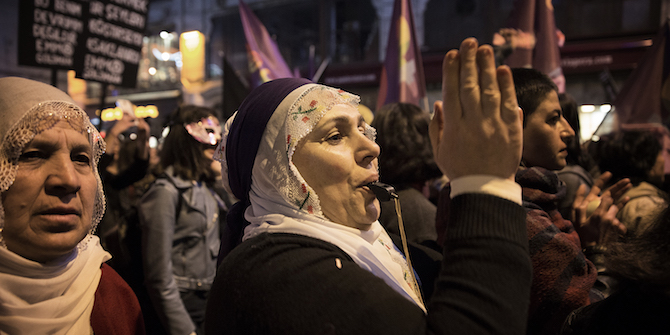
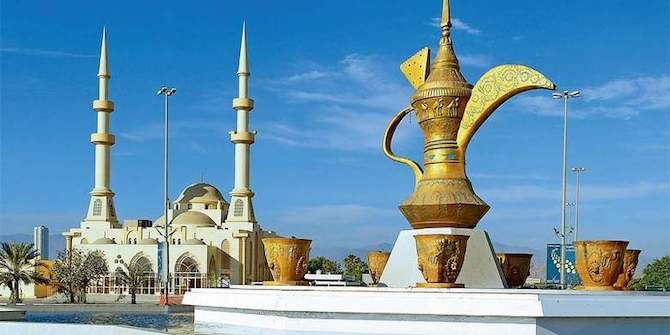
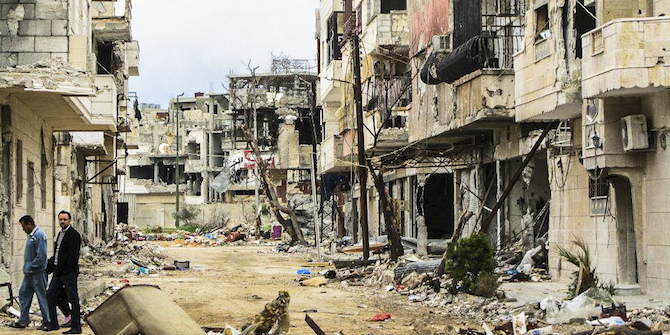
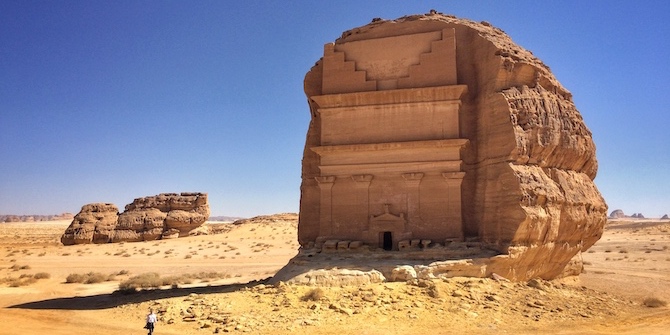
Alice,
You have no right to present the algerian polisario guerrilla members as angels. You are hurting the UN process on Western Sahara issue opposing Morocco to algeria since cold war. algeria military dictature “used” the polisario guerrilla to harass Morocco in its decolonization process. For that, algeria army had to populate the polisario gulags SW algeria. They kidnapped Western Saharawi from South Morocco. They also kidnapped Mauritanian, Malian…Today, the polisario gulags are composed of saharawi & non-saharawi from the Great Sahara who have no political legitimacy over the Western Sahara territory. The algerian masquerade is over now as everyone around the world knows that the Western Sahara territory is for Moroccan Saharawi only i.e. Western Saharawi. If algeria military dictature insists to give sovereignty to the algerian saharawi composing polisario, it should give them a piece of land in the SW of algeria. The new state will be the South Algeria Democratic Republic (SADR). For that, there is a need for a referendum in algeria and a recognition by the UN. After South Sudan is it time to give a chance to South Algeria? Time will tell. Last but not least, you should never forget that Brahim Ghali, the SG of polisario, and many other leaders, are prosecuted by Madrid Court for Crimes against Humanity and sexual abuses on women, thus since 1976.
Ahmed Salem Amr Khaddad
Western Saharawi